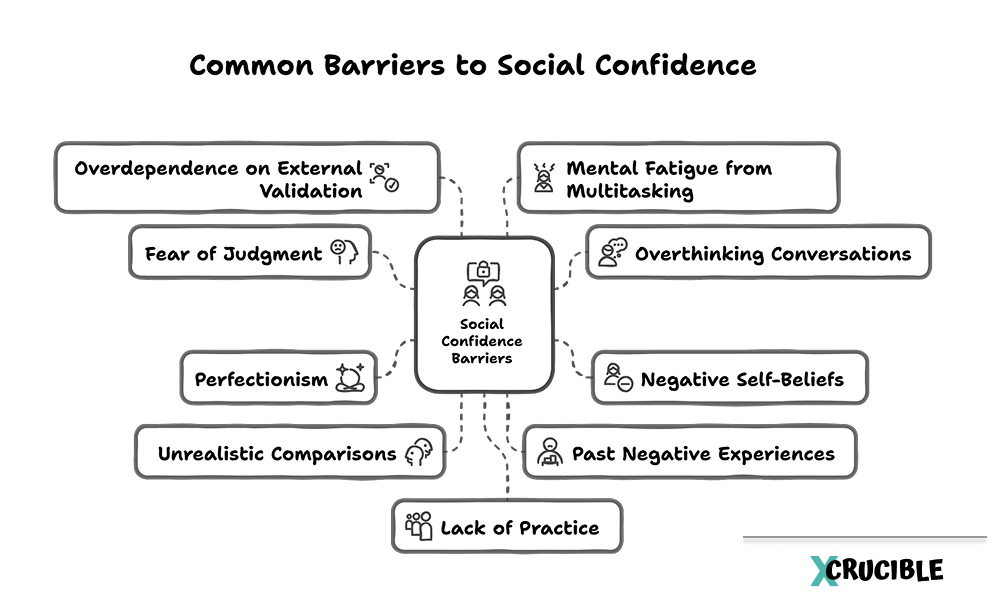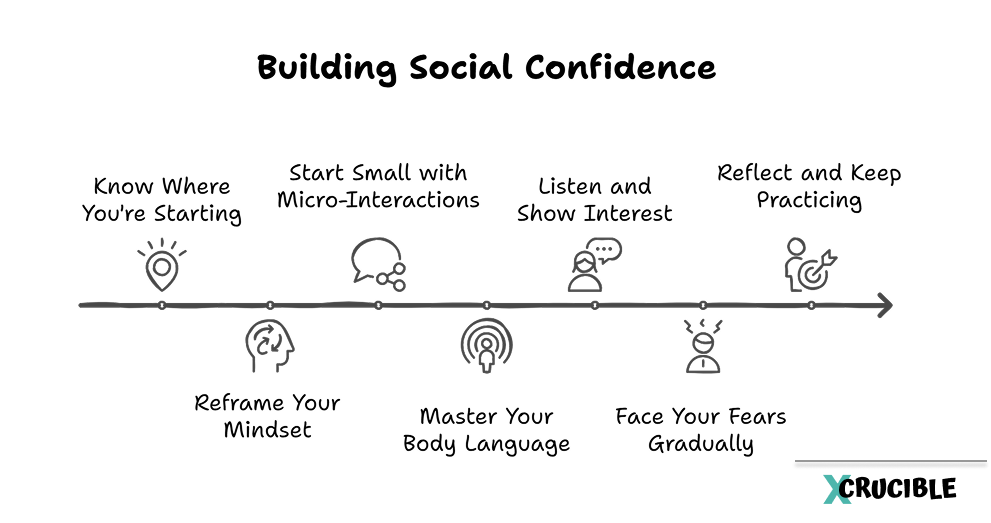Do you ever feel nervous when you’re about to speak up in a group or start a conversation with someone new? If so, you’re not alone. Many people — even those who seem outgoing — sometimes feel unsure in social situations. (Yes, you read it right!)
The truth is, social confidence isn’t something you’re either born with or without. It’s a skill you can build, step by step.
We are here to help you do just that.
I’ll walk through a simple, practical process to help you feel more comfortable and confident when interacting with others. Whether you’re looking to make new friends, connect better at work, or just feel more relaxed in everyday conversations, these steps are designed to support you.
What Is Social Confidence?
Social confidence is the ability to engage with others calmly, clearly, and without the constant fear of being judged. It’s about feeling grounded in who you are — not because you always know what to say, but because you trust yourself to handle the moment.
It’s not the same as being outgoing or extroverted. You can be quiet and confident, or talkative and unsure. Social confidence isn’t about volume — it’s about comfort and control.
In short, it’s the skill of navigating social situations with clarity and self-assurance.
Quick Self-Check: How Socially Confident Are You?
Read each sentence below and think: “Does this sound like me?”
- I usually wait for others to start conversations.
- I often replay what I said after social situations.
- I feel nervous when meeting new people.
- I sometimes avoid speaking up even when I want to.
- I worry about saying something wrong or awkward.
- I sometimes compare myself to others who seem more confident.
- I feel unsure about how to join group conversations.
- I find it hard to maintain eye contact during talks.
- I get anxious before social events.
- I avoid social situations because they feel overwhelming.
What Your Answers Might Mean
0–2 Yes: You’re doing great! Keep it up.
3–5 Yes: On your way — small steps can go a long way.
6–9 Yes: Totally fine. Start small and build from there.
Let’s get in!
The Science Behind
Social confidence is shaped by how your brain interprets social situations — not by personality.
When you enter a social setting, your brain scans for potential threats. It may treat eye contact, silence, or unfamiliar people as risks, triggering discomfort. This response comes from the amygdala, the part of the brain that handles fear.
Over time, your brain forms patterns based on how often you engage or withdraw. These patterns influence your belief in your ability to handle social situations — what psychology calls self-efficacy (the belief that “I can do this”). The stronger this belief, the more confident your behavior becomes.
Your brain also builds identity through observation. According to self-perception theory, if you regularly speak up or take part in conversations, your mind starts to see you as someone who belongs in social spaces. Confidence grows from that internal shift.
In short, social confidence is a learned response shaped by perception, belief, and habit — not something you’re born with.
Why Social Confidence Matters
Social confidence goes beyond just feeling comfortable around others — it plays a crucial role in your overall quality of life.
When you feel socially confident, you can express yourself clearly and build stronger, more meaningful relationships. This helps reduce misunderstandings and increases trust.
In professional settings, confidence affects how you communicate in interviews, meetings, and networking, opening doors to new opportunities.
It also has a direct impact on mental health. Engaging socially can reduce feelings of loneliness and improve resilience.
Key benefits of social confidence include:
- Feeling heard and understood in conversations
- Forming deeper connections with people around you
- Making bold moves in your career or business life
- Protecting your peace by managing anxiety and stress
- Tackling tough talks or awkward moments without fear
Simply put, social confidence empowers you to connect and succeed in all areas of life.
Common Barriers to Social Confidence
Even people who seem confident on the outside often deal with internal blockers. Recognizing these barriers is the first step to moving past them. Here are the most common ones:

Fear of Judgment
Worrying about what others think is normal, but it shouldn’t stop you from expressing yourself. Remember, most people are focused on themselves, not on judging you. Letting go of this fear frees you to be authentic.
Overthinking Conversations
Replaying what you said or worrying what to say next traps you in your head and takes you out of the moment. Instead, try to stay present and accept that not every interaction has to be perfect. Take it easy!
Negative Self-Beliefs
We all have critical inner voices, but believing negative labels like “awkward” or “not interesting”damage your self-esteem. Challenging those thoughts can open the door to new, more positive experiences.
Perfectionism
You don’t have to be always 100% right. Said something lame? That’s okay! Accepting that mistakes and awkward moments lowers pressure and boosts confidence. Perfection is a myth.
Unrealistic Comparisons
Comparing yourself to others’ polished social media personas or charismatic friends can damage your confidence before you even start. Just be you!
Past Negative Experiences
We all have moments we wish we could forget. But those memories don’t define you. With time and effort, you can create new, positive memories that build your confidence.
Overdependence on External Validation
Relying heavily on praise or approval from others makes your confidence fragile. Sustainable social confidence is built from internal validation and self-acceptance.
Mental Fatigue from Multitasking
Trying to simultaneously manage your words, tone, body language, and interpret others’ reactions can exhaust your mental resources. This overload reduces natural confidence and makes socializing feel draining.
Lack of Practice
Social confidence grows with practice, just like any other skill. If you don’t give yourself opportunities to interact in social situations, it’s harder to build that natural ease.
7 Step Plan to Build Social Confidence
Building social confidence is a process — it takes time, patience, and consistent effort. Here’s a simple, practical roadmap to help you grow more comfortable and assured in social situations.

1. Know Where You’re Starting
Self-awareness is your foundation. Be honest about how confident you feel right now — no judgment. Understanding this helps you see your progress clearly.
Try this:
- Reflect on recent social interactions and your feelings about them.
- Identify moments where you felt either comfortable or uneasy.
- Practice self-kindness; remind yourself that growth starts from acceptance.
2. Reframe Your Mindset
Fear of judgment often holds us back. By shifting your mindset to see social interactions as learning opportunities rather than tests, you create space to be yourself and grow. Your mindset can be your greatest ally or biggest barrier.
Remember Henry Ford’s saying:
“Whether you think you can or you think you can’t, you’re right.”
Try this:
- Replace “What if I mess up?” with “What can I learn here?”
- Remind yourself most people are busy thinking about themselves, not judging you.
- Use positive thoughts like “I’m enough just as I am.”
3. Start Small with Micro-Interactions
Practice confidence in everyday low-pressure situations to build momentum.
Try this:
- Say “hi” or smile at a neighbor or cashier.
- Ask simple questions, like “How’s your day going?”
- Make small talk about the weather or surroundings.
4. Master Your Body Language
How you carry yourself sends a message — to others and yourself.
Try this:
- Keep your back straight and shoulders relaxed.
- Maintain soft, steady eye contact.
- Take slow, deep breaths to feel calm and grounded.
5. Listen and Show Interest
Being a good listener helps conversations flow naturally and takes pressure off you to constantly think of what to say next. Showing genuine interest invites connection.
Try this:
- Nod or say short phrases like “I see” or “That’s interesting.”
- Ask open-ended questions like “What do you enjoy about that?”
- Don’t rush to fill pauses — silence is okay.
6. Face Your Fears Gradually
Step out of your comfort zone bit by bit, facing harder social situations over time. Ditch the “what ifs.”
Try this:
- Start talking in small groups before joining bigger ones.
- Speak up in meetings or social events when you feel ready.
- Set simple goals, like introducing yourself to one new person.
7. Reflect and Keep Practicing
Reflection lets you celebrate progress and learn from experiences. Consistent practice turns new behaviors into habits, making confidence a natural part of who you are.
Try this:
- After social events, think about what went well and what you can improve.
- Reward yourself for trying, even if it feels tough.
- Plan regular chances to practice social skills.
Final Thoughts
Social confidence isn’t about being outgoing all the time or having the perfect thing to say. It’s about building trust in yourself — knowing that you can handle social moments without overthinking or retreating.
The process takes time. Some days will feel easier than others, and that’s part of it. What matters most is showing up consistently, even in small ways. With practice, the discomfort fades and is replaced by a quiet sense of ease.
You don’t have to become someone else to feel confident. You just need to become more comfortable being yourself — around others, and in your own mind.
Start where you are. Stay consistent. And give yourself permission to grow at your own pace.
Ready to take the next step?
Try one small action from the 7-step plan today — whether it’s saying hello to someone new or simply practicing calm, confident body language. Every step forward counts.
You’ve got this. The hardest part is starting, and you’re already on your way.